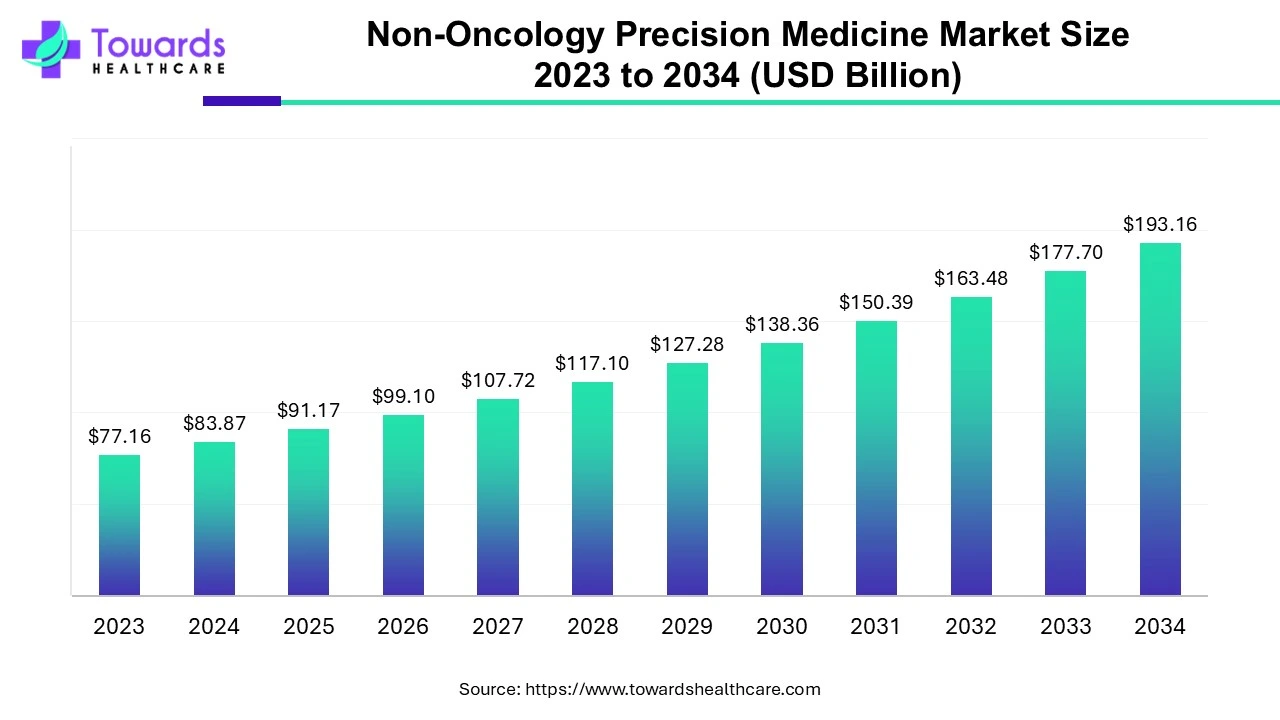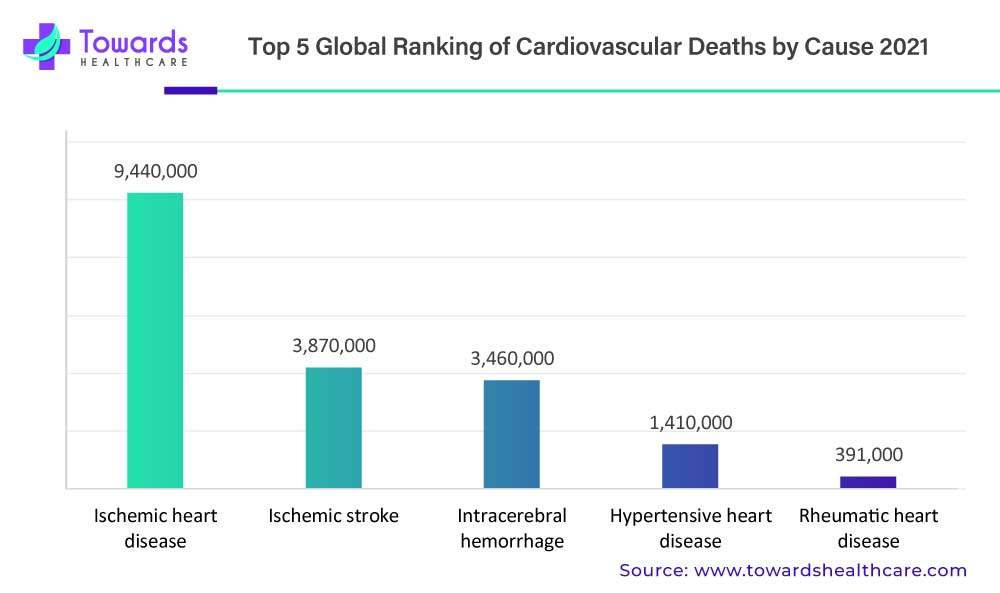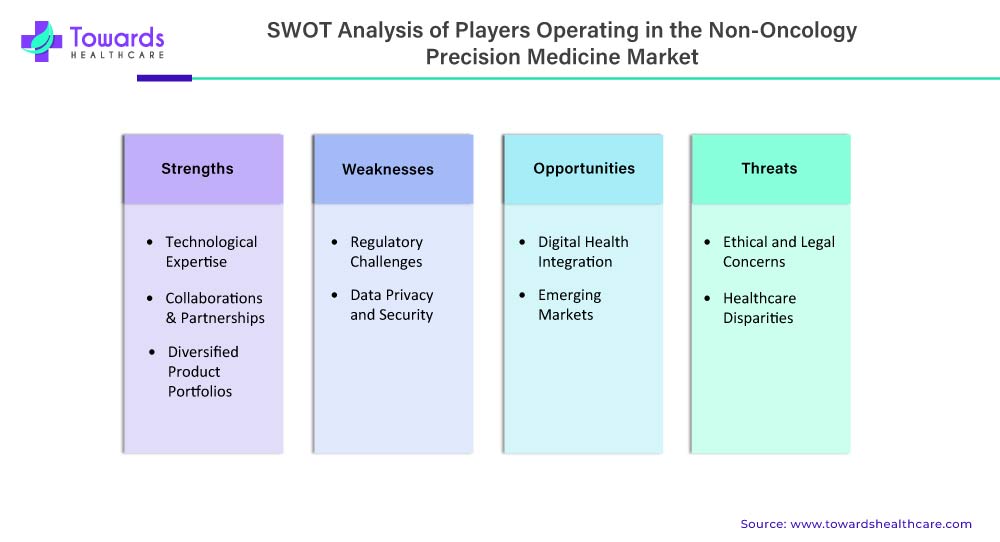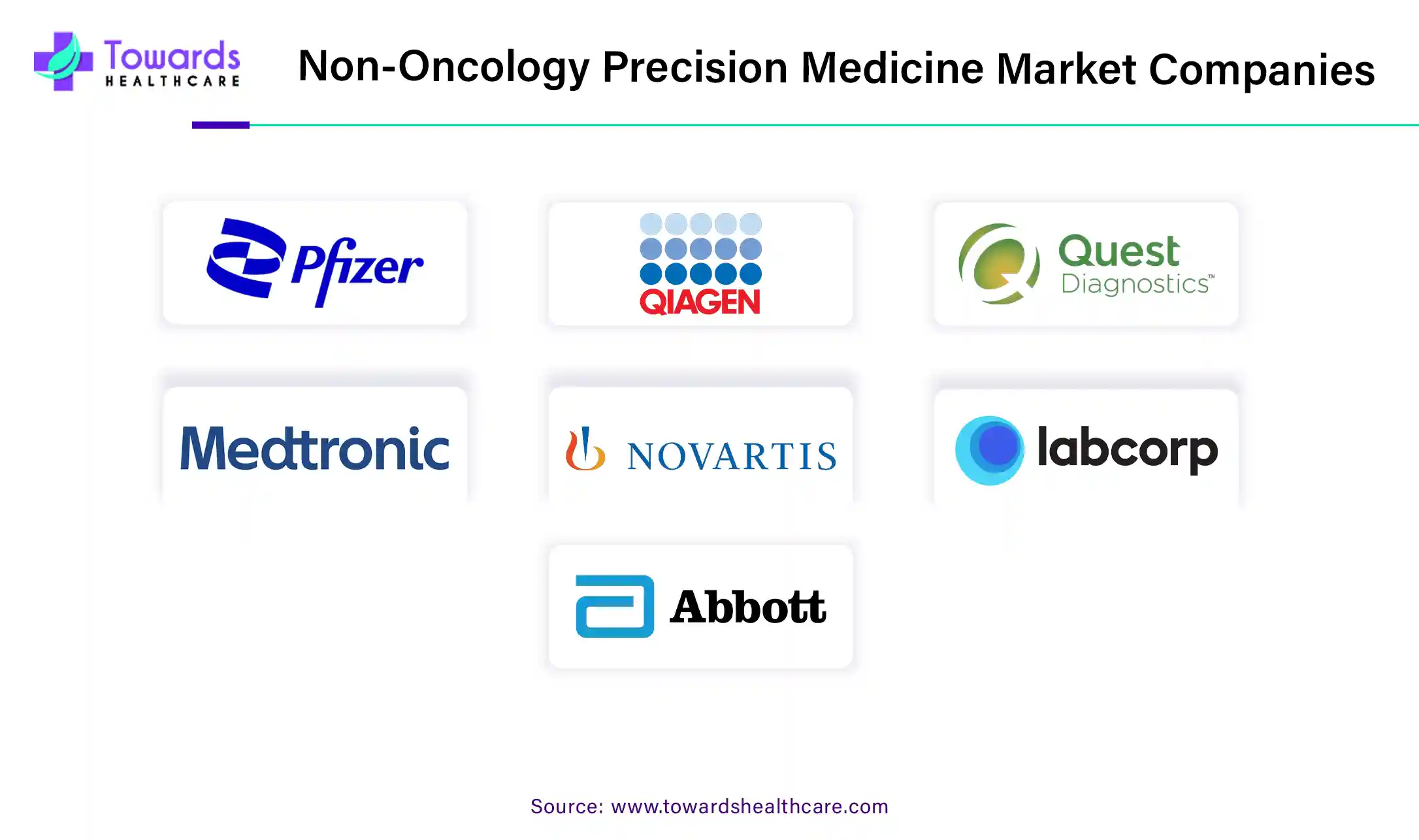December 2025

The global non-oncology precision medicine market size is expected to increase from USD 91.17 billion in 2025 to USD 193.16 billion by 2034, growing at a CAGR of 8.7% throughout the forecast period from 2025 to 2034, as a result of rising clinical trials and the increasing number of product approvals.

Rapid advancements in genomics and molecular diagnostics driving personalized treatment approaches in non-oncology conditions.
The non-oncology precision medicine market is a rapidly growing sector within the healthcare industry. Precision medicine aims to provide tailored treatment and preventive measures based on an individual's genetic, environmental, and lifestyle factors. While precision medicine initially gained traction in the field of oncology, its applications are expanding to other disease areas.
The market for non-oncology precision medicine is driven by several factors. First and foremost, advancements in genomics, proteomics, and other molecular diagnostic technologies have enabled the identification of specific biomarkers and genetic variations associated with various non-oncological diseases. This knowledge allows for more targeted and personalized approaches to treatment and prevention.
Non-oncology precision medicine finds applications in diverse therapeutic areas, including cardiovascular diseases, neurology, infectious diseases, autoimmune disorders, and rare genetic conditions. By understanding an individual's unique genetic makeup and disease risk factors, healthcare providers can design customized treatment plans and interventions. As precision medicine continues to evolve and gain acceptance in non-oncology areas, it is expected to revolutionize the healthcare industry by shifting from a one-size-fits-all approach to a more personalized and targeted approach to patient care.
Advancements in genomic technologies are a major driver for the non-oncology precision medicine market. Genomic sequencing, high-throughput screening, and other molecular diagnostic techniques have significantly enhanced our understanding of the genetic basis of non-oncological diseases.
Genomic sequencing technologies such as next-generation sequencing (NGS), have become more accessible and cost-effective, enabling the analysis of an individual's entire genome or specific genetic regions associated with disease susceptibility. This wealth of genetic information allows healthcare providers to identify genetic variations, mutations, and biomarkers that contribute to the development and progression of non-oncological diseases.
These advancements in genomic technologies have facilitated the discovery of new therapeutic targets and biomarkers for non-oncological conditions. For example, in cardiovascular diseases, genetic variations associated with cholesterol metabolism, blood clotting, and cardiac function have been identified, leading to the development of targeted therapies and personalized treatment plans.
In addition, genomic technologies have enabled the identification of rare genetic disorders and the development of tailored treatments for patients with these conditions. Through whole-exome sequencing and targeted genetic testing, clinicians can pinpoint specific genetic mutations responsible for rare diseases and design personalized interventions, including gene therapies and precision drugs.
Furthermore, the integration of genomic data with electronic health records (EHRs) and clinical databases has facilitated the discovery of genotype-phenotype correlations and the development of predictive models for disease risk assessment. By leveraging machine learning algorithms and artificial intelligence, healthcare providers can analyze large-scale genomic and clinical datasets to identify individuals at high risk of developing certain non-oncological diseases and initiate preventive measures or early interventions.
The continuous advancements in genomic technologies, such as single-cell sequencing, long-read sequencing, and epigenetic profiling, hold further promise for non-oncology precision medicine. In January 2023, Apollo Hospitals Navi Mumbai India, a leading quaternary care hospital, introduced the Apollo Genomics Institutes. This specialized facility aims to deliver holistic care to individuals and families affected by genetic disorders. By leveraging advanced genomic technologies, the institute provides personalized and tailored medical treatments, enhancing precision medicine approaches. These technologies provide deeper insights into cellular processes, gene regulation, and disease mechanisms, allowing for more accurate diagnosis, prognosis, and treatment selection.
The growing demand for personalized medicine is a significant driver for the non-oncology precision medicine market. Patients and healthcare providers are increasingly recognizing the limitations of the traditional one-size-fits-all approach to treatment and are seeking more tailored and effective therapeutic options. Personalized medicine considers an individual's unique genetic makeup, lifestyle factors, environmental exposures, and disease characteristics to optimize treatment outcomes. By identifying specific molecular targets and biomarkers, personalized medicine enables the development of targeted therapies and interventions that have higher efficacy and fewer adverse effects.
In non-oncological diseases, personalized medicine offers opportunities for early detection, prevention, and disease management. For example, in cardiovascular diseases, genetic testing can identify individuals with a higher risk of developing conditions such as hypertension or dyslipidemia. With this knowledge, healthcare providers can implement lifestyle modifications, prescribe appropriate medications, and closely monitor these individuals to prevent or delay disease progression.

In neurology, personalized medicine approaches are being employed for conditions such as Alzheimer's disease, Parkinson's disease, and multiple sclerosis. Genetic testing and biomarker analysis aid in early diagnosis, risk assessment, and the development of targeted therapies that address the specific underlying molecular mechanisms of these diseases. This indicates the growing significance and recognition of personalized medicine approaches in the pharmaceutical industry.
Furthermore, infectious diseases can benefit from personalized medicine strategies. Genetic variations in host immune response genes can influence susceptibility to infections, response to treatments, and vaccine efficacy. By identifying these genetic variations, healthcare providers can tailor treatment regimens, select appropriate antiviral or antibiotic agents, and improve patient outcomes.
The increasing availability of direct-to-consumer genetic testing and the rise of patient empowerment further contribute to the demand for personalized medicine. Patients are becoming more proactive in managing their health and seek genetic testing to gain insights into their disease risk profile and make informed decisions about their lifestyle and preventive measures.
The combination of advancements in genomic technologies and the growing demand for personalized medicine creates a conducive environment for the expansion of the non-oncology precision medicine market. Market players should focus on developing innovative diagnostic tools, biomarker discovery platforms, and targeted therapies that align with the principles of personalized medicine.
Ethical and legal challenges pose a major restraint for the non-oncology precision medicine market. The collection, storage, analysis, and sharing of genetic and personal health information raise concerns regarding patient privacy, data security, informed consent, and potential misuse of sensitive information. Genetic data is unique and inherently identifiable to individuals and their families, raising privacy concerns. Unauthorized access, data breaches, or misuse of genetic data can result in discrimination, stigmatization, and psychological distress for patients. Protecting patient privacy and ensuring secure storage and transmission of genetic data is critical for maintaining public trust in precision medicine.
Informed consent is another ethical consideration in the context of non-oncology precision medicine. Patients need to fully understand the implications of genetic testing, including the potential risks, limitations, and the use of their data for research purposes. Healthcare providers must ensure that patients have access to genetic counseling and education to make informed decisions about genetic testing and the use of their genetic information.
The legal landscape surrounding genetic data and precision medicine is complex and varies across jurisdictions. Regulatory frameworks must address issues such as data ownership, data sharing, liability, and intellectual property rights. Compliance with data protection regulations, such as the General Data Protection Regulation (GDPR) in Europe, adds another layer of complexity for market players operating globally.
Moreover, the interpretation of genetic data and the determination of disease risk are not always straightforward. Genetic variations and mutations may have different implications depending on an individual's specific genetic background and environmental factors. The complexity of genetic information requires careful communication and counseling to avoid misinterpretation or overdiagnosis.
Furthermore, there is a risk of exacerbating health disparities and inequities in access to precision medicine. Genetic testing and targeted therapies may not be equally accessible or affordable to all populations, leading to disparities in healthcare outcomes. Ensuring equitable access to precision medicine requires addressing issues of affordability, education, and healthcare infrastructure.
To overcome these ethical and legal challenges, market players in non-oncology precision medicine should prioritize transparency, patient education, and data security. Developing clear policies and protocols for data collection, storage, and sharing, while respecting patient privacy rights, is crucial. Collaborating with regulatory bodies and stakeholders to establish ethical guidelines and standards can also foster public trust and facilitate the responsible implementation of precision medicine.
By product, the therapeutics segment held a dominant presence in the market in 2024. Precision medicines are predominantly preferred as therapeutics against numerous chronic disorders. The goal of precision medicines is to provide the right treatment to the right patient at the right dosages and at right time. Some common examples of precision medicines as therapeutics include cell and gene therapy, monoclonal antibodies, and tissue-engineered products. The rising prevalence of chronic disorders necessitates the development of novel therapeutics and new product launches propel the segment’s growth.
By product, the diagnostics segment is expected to grow at the fastest rate in the market during the forecast period. The rapidly expanding molecular biology sector and technological advancements lead to the development of novel and advanced molecular testing kits for the detection of chronic disorders. These kits can provide tailored detection of numerous disorders, allowing for precise identification. This enables healthcare professionals to suggest more targeted therapeutic interventions.
By application, the CNS segment held the largest share of the market in 2024. CNS disorders affect the brain, spinal cord, or other parts of the nervous system. The rising incidences of stroke, neurological infections, Alzheimer’s disease (AD), and spinal cord injury (SCI) boost the segment’s growth. In the U.S., approximately 6.7 million Americans 65 years and older are living with AD, and is estimated that, by 2060, 13.8 million Americans will develop AD. The growing research and development activities and the increasing number of clinical trials support the segment’s growth. As of 2024, 164 clinical trials were conducted related to Alzheimer’s disease.
By application, the immunology segment is anticipated to grow with the highest CAGR in the market during the studied years. The rising prevalence of immunological disorders and growing research and development activities to develop novel immunological therapeutics promote the segment’s growth. Some common examples of immunological disorders include rheumatoid arthritis, eczema, psoriasis, and allergic rhinitis. The prevalence of eczema in the U.S. is around 10% to 15% for children and 7% to 10% for adults.
By end-user, the diagnostic centers segment led the global non-oncology precision medicine market in 2024. Diagnostic centers provide a wide range of testing services such as MRI, CT scan, ultrasound, X-rays, and blood tests to identify patient conditions, all at one place. The presence of skilled professionals and the rising adoption of advanced technologies boost the segment’s growth. The availability of specialized equipment and suitable capital investment also attract more customers to diagnostic centers.
North America dominates the non-oncology precision medicine market, with the United States as the largest market share holder. The region's strong healthcare infrastructure, significant investments in precision medicine research, and presence of key market players contribute to its leadership position. The United States has witnessed a surge in public and private initiatives aimed at advancing precision medicine. The Precision Medicine Initiative launched by the U.S. government focuses on accelerating the development and adoption of precision medicine approaches across various disease areas. The initiative promotes collaborations between academia, industry, and healthcare organizations to facilitate research, data sharing, and clinical implementation of precision medicine.
The U.S. non-oncology precision medicine market is growing due to advancements in genomic technologies, supportive government initiatives like the All of Us Research Program, and favorable regulations such as the 21st Century Cures Act. The integration of AI in clinical decision-making and diagnostics is also enhancing personalized treatment approaches for conditions beyond cancer, fueling market expansion.
Canada’s non-oncology precision medicine market is growing due to advancements in genomics, rising cases of chronic illnesses, and increasing investment in research and development. The integration of AI and digital health tools is improving personalized care delivery, while supportive regulatory frameworks and a shift toward patient-centered healthcare are further accelerating the market's expansion.
The Asia-Pacific region is expected to exhibit the fastest growth rate in the non-oncology precision medicine market. Within the region, China stands out as a major contributor to this growth, driven by factors such as a large population, increasing healthcare expenditure, and government initiatives to promote precision medicine. China has witnessed rapid advancements in genomics, bioinformatics, and data analytics, positioning the country at the forefront of precision medicine research and implementation. The Chinese government has launched initiatives to support precision medicine, including the Precision Medicine Initiative and the Healthy China 2030 Plan, which aim to promote personalized healthcare and disease prevention.
China’s market is growing rapidly due to strong government initiatives like the Precision Medicine Initiative and Healthy China 2030. Advances in genomics and data analytics, increased healthcare spending, and regulatory support are accelerating personalized care. Additionally, growing public-private investments and academic collaborations are driving innovation and the adoption of tailored treatment approaches.
India's market is growing due to the high prevalence of chronic diseases like cardiovascular conditions and diabetes. Advancements in genomic technologies and AI-driven data analytics are enabling more personalized treatments. Government initiatives such as the Genome India Project and National Digital Health Mission further support the expansion by promoting data collection and precision healthcare solutions.
Europe’s market is growing due to advancements in genomic technologies, government initiatives like the Genome Europe Initiative, and regulatory support from the European Medicines Agency (EMA). The integration of AI in healthcare and increased collaborations between academia and biotech firms further drive innovation, improving personalized care and accelerating market expansion.
The UK’s market is growing due to government initiatives like the GENOME UK strategy, which promotes genomics in healthcare. Advancements in genomic technologies and the integration of AI in healthcare are improving diagnostics and personalized treatments. Additionally, the NHS's plans for whole genome sequencing are further boosting market expansion.
Germany’s market is expanding due to government initiatives like the GenomeDE National Strategy for Genomic Medicine and research collaborations such as m4 and GANI_MED. Technological advancements, particularly in AI integration, and Germany’s strong healthcare infrastructure also support the market’s growth, enhancing personalized treatment delivery and fostering innovation in precision medicine.
The integration of artificial intelligence (AI) and machine learning (ML) technologies presents a significant opportunity in the non-oncology precision medicine market. AI and ML have the potential to transform healthcare by analyzing large-scale genomic data, clinical records, and real-time patient monitoring to generate actionable insights and support clinical decision-making. AI and ML algorithms can identify patterns, correlations, and predictive models that aid in disease diagnosis, risk assessment, and treatment selection. By analyzing diverse datasets and integrating genetic, environmental, and lifestyle factors, AI-powered systems can provide more accurate and personalized recommendations for patients.
In non-oncology precision medicine, AI and ML can assist in the interpretation of complex genetic data, identification of disease biomarkers, and prediction of treatment responses. These technologies can enable clinicians to stratify patient populations based on disease subtypes, genetic variations, and response profiles, leading to targeted therapies with higher efficacy.
Moreover, AI and ML algorithms can support the development of predictive models for disease prevention and early intervention. By leveraging data from wearable devices, electronic health records, and genetic profiles, AI-powered systems can identify individuals at high risk of developing non-oncological diseases and recommend preventive measures, lifestyle modifications, or personalized screening programs. The integration of AI and ML in precision medicine also holds promise for accelerating drug discovery and development. By analyzing large datasets on disease mechanisms, drug targets, and molecular interactions, AI algorithms can identify novel therapeutic targets and facilitate the design of precision drugs. ML models can also enhance the efficiency of clinical trials by identifying patient populations most likely to respond to specific treatments, thus optimizing trial design and reducing costs.
Market players in non-oncology precision medicine should invest in AI and ML capabilities, develop robust data infrastructure, and collaborate with technology partners to harness the power of these technologies. Data security, privacy, and regulatory compliance must be prioritized to ensure the responsible and ethical use of AI in precision medicine.

Dr. Eyal Zimlichman, Founder & Director of ARC Innovation, envisioned that breakthroughs in precision medicine would expand and advance significantly in 2025 and beyond, especially for the identification of biomarkers, enabling more tailored treatments. He also emphasized the role of AI in precision medicine to analyze existing multi-omics data, digital pathology, and proteomics.

By Product Type
By Application
By End-use
By Region
December 2025
January 2026
December 2025
November 2025